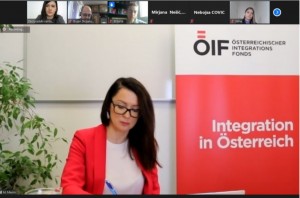BCHR Holds Panel Discussion “Challenges in Refugee Integration in Serbia and Presentation of the Austrian Integration Model”
 With the support of UNHCR in Serbia, the Belgrade Centre for Human Rights (BCHR) on 15 December held an online panel discussion entitled “Challenges in Refugee Integration in Serbia and Presentation of the Austrian Integration Model”. The BCHR has traditionally been holding events on refugee integration in Serbia’s society at the end of the year. This event was an opportunity to discuss the integration of refugees in Serbia, present the successful practices of other countries, exchange experiences and map problems.
With the support of UNHCR in Serbia, the Belgrade Centre for Human Rights (BCHR) on 15 December held an online panel discussion entitled “Challenges in Refugee Integration in Serbia and Presentation of the Austrian Integration Model”. The BCHR has traditionally been holding events on refugee integration in Serbia’s society at the end of the year. This event was an opportunity to discuss the integration of refugees in Serbia, present the successful practices of other countries, exchange experiences and map problems.
In her opening remarks, BCHR Executive Director Sonja Tošković discussed the importance of refugee integration and BCHR’s years-long efforts to improve the national asylum system. BCHR’s Senior Refugee Integration Adviser Jelena Ilić presented the identified problems in refugee integration and BCHR’s experience in assisting refugees in the integration process.
Mirela Memić, the Head of the Values and Orientation Department of the Austrian Integration Fund (Österreichische Integrationsfonds – ÖIF), presented the ÖIF, its role in refugee integration and successful Austrian integration models. The Fund manages local integration centres across Austria, extending integration assistance to refugees through counselling, integration and language courses and provision of services by mobile teams.
 Since it opened in 1961, the ÖIF has set the foundations for the successful integration of refugees, from those who fled the former Yugoslavia to the ones who arrived during the ongoing refugee crisis. The following three pillars are key in the work of ÖIF:
Since it opened in 1961, the ÖIF has set the foundations for the successful integration of refugees, from those who fled the former Yugoslavia to the ones who arrived during the ongoing refugee crisis. The following three pillars are key in the work of ÖIF:
– Orientation and counselling at nine integration centres and 30 mobile centres across the country;
– German language courses;
– Media visibility of the Fund and publications it issues, as well as mentoring similar institutions abroad and the integration barometer with plans and recommendations for the next period.
Mirela Memić said that the success of refugee integration in Austria lay in the structured and carefully designed courses implemented for clearly defined groups – women, children, parents, etc. on topics related to the prevention of xenophobia and anti-Semitism, and specially designed courses to prevent violence against women. The goodwill ambassadors rallied round the ÖIF are an important element of its work. Goodwill ambassadors are former refugees who have successfully integrated in Austrian society, successful professionals who support the ÖIF and promote it in the media, giving motivational speeches in schools on multiculturalism and the role of refugees in creating a better and more colourful Austrian society.
The panellists discussed the problems in practice and the 2021 integration-related plans aiming to strategically improve the process. The event was attended by 49 representatives of state institutions, the Commissariat for Refugees and Migration, the National Employment Service, the Ministry of Labour, Employment and Veteran and Social Issues, the UNHCR Office in Belgrade, international organisations and CSOs. The event provided the participants with the opportunity to discuss possibilities of cooperation among the key stakeholders and concerted efforts to improve the integration of refugees. The presented Austrian integration model should motivate us to apply the ideas and lessons learned in Austria in order to help improve the lives of refugees in Serbia.
The panel discussion was organised within the “Support to Refugees and Asylum Seekers” project BCHR has been conducting with UNHCR’s support.








